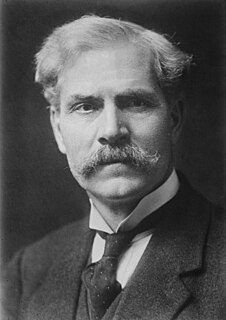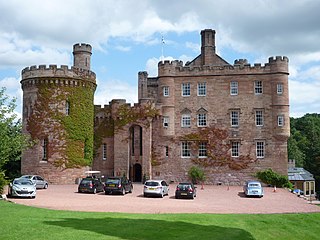Related Research Articles

The 1929 United Kingdom general election was held on Thursday, 30 May 1929 and resulted in a hung parliament. It stands as the fourth of six instances under the secret ballot, and the first of three under universal suffrage, in which a party has lost on the popular vote but won the highest number of seats versus all other parties. In 1929, Ramsay MacDonald's Labour Party won the most seats in the House of Commons for the first time. The Liberal Party led again by former Prime Minister David Lloyd George regained some ground lost in the 1924 general election and held the balance of power. Parliament was dissolved on 10 May.

Earl of Dalhousie, in the County of Midlothian, is a title in the Peerage of Scotland, held by the Chief of Clan Ramsay.

Fox Maule-Ramsay, 11th Earl of Dalhousie,, known as Fox Maule before 1852, as The Lord Panmure between 1852 and 1860, was a British politician.

John William Maule Ramsay, 13th Earl of Dalhousie, styled Lord Ramsay between 1874 and 1880, was a Scottish naval commander, courtier and Liberal politician. He served as Secretary for Scotland in William Ewart Gladstone's short-lived 1886 administration.

Ramsay Heatley Traquair FRSE FRS was a Scottish naturalist and palaeontologist who became a leading expert on fossil fish.
John Ramsay was a Scottish distiller, merchant and Liberal Party politician.

Sir Alexander Charles Ramsay-Gibson-Maitland, 3rd baronet was a Scottish Liberal politician who sat in the House of Commons from 1868 to 1874.
The 1874 Cambridgeshire by-election was fought on 3 January 1874. The byelection was fought due to the Succession to a peerage of the incumbent MP of the Conservative Party, Viscount Royston. It was won by the Conservative candidate Elliot Yorke who was unopposed.
The 1874 St Ives by-election was fought on 28 December 1874. The byelection was fought due to the death of the incumbent Conservative MP, Edward Davenport. It was won by the Conservative candidate Charles Praed who received 617 votes against Liberal candidate Sir Francis Lycett's 552 votes. During the election, the town held a holiday, with shops closed and ships not leaving harbour.

The 1874 Birkenhead by-election was fought on 24 November 1874. The byelection was fought due to the death of the incumbent Conservative MP, John Laird. It was won by the Conservative candidate David MacIver.
The 1874 Midhurst by-election was fought on 23 September 1874. The byelection was fought due to the succession to a peerage of the incumbent Conservative MP, Charles Perceval. It was won by the Conservative candidate Sir Henry Holland who was unopposed.
The 1874 Haverfordwest by-election was fought on 12 June 1874. The byelection was fought due to the voiding of the election of the incumbent Liberal MP, The Lord Kensington. It was retained by the incumbent who ran unopposed.
The 1874 City of Durham by-election was fought on 13 June 1874. The byelection was fought due to the voiding of the incumbent Liberal MP, Thomas Charles Thompson's election. It was retained by the Liberal candidate Farrer Herschell.
The 1874 Hackney by-election was fought on 24 April 1874. The byelection was fought due to the void Election of the incumbent Liberal MP, John Holms. It was retained by Holms.
The 1874 North Lancashire by-election was fought on 26 March 1874. The by-election in the North Lancashire constituency was fought due to the elevation to the peerage of the incumbent Conservative MP, John Wilson-Patten. It was won by the Conservative candidate Thomas Henry Clifton who was unopposed.
The 1874 Buckinghamshire by-election was fought on 17 March 1874. The byelection was fought due to the incumbent Conservative MP, Benjamin Disraeli, becoming the prime minister and First Lord of the Treasury and so having to resign his seat. It was retained by Disraeli, who was unopposed.
The 1874 Eye by-election was fought on 17 March 1874. The byelection was fought due to the incumbent Conservative MP, George Barrington, becoming Vice-Chamberlain of the Household. It was retained by the incumbent.
The 1874 Huntingdon by-election was fought on 16 March 1874. The byelection was fought due to the incumbent Conservative MP, John Burgess Karslake, becoming Attorney General for England and Wales. It was retained by the incumbent, who was unopposed.
The 1874 Glasgow and Aberdeen Universities by-election was fought on 14 March 1874. The byelection was fought due to the incumbent Conservative MP, Edward Strathearn Gordon, becoming Lord Advocate. It was retained by the incumbent who was unopposed.

The 1929 United Kingdom general election was held on Thursday 30 May 1929 and resulted in a hung parliament. It stands as the fourth of six instances under the secret ballot, and the first of three under universal suffrage, in which a party has lost on the popular vote but won the highest number of seats versus all other parties – others are 1874, January 1910, December 1910, 1951 and February 1974. In 1929, Ramsay MacDonald's Labour Party won the most seats in the House of Commons for the first time. The Liberal Party re-led by ex-Prime Minister David Lloyd George regained some ground lost in the 1924 election and held the balance of power.
References
- ↑ Craig, F. W. S. (1977). British parliamentary election results 1832–1885 (1 ed.). London: Macmillan. p. 544.